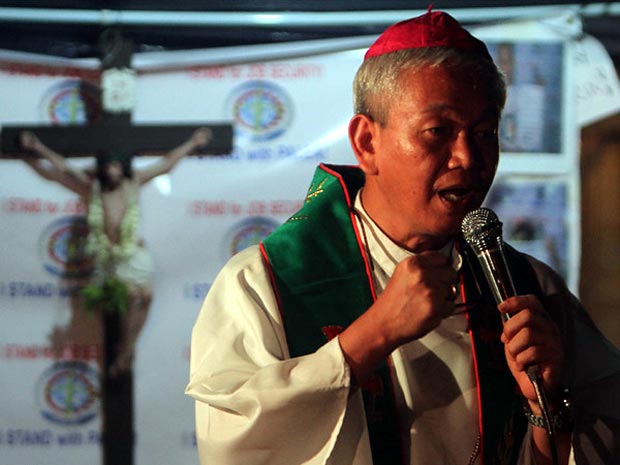
Manila Auxiliary Bishop Broderick Pabillo. INQUIRER FILE PHOTO
Two Catholic clergymen criticized the “subservient Congress” for allowing the extension of martial law in Mindanao and warned of the creeping authoritarianism it will purportedly spawn.
Writing in his blog on the day Congress approved the one-year extension of martial law, Manila Auxiliary Bishop Broderick Pabillo urged Filipinos to speak up against Congress.
Redemptorist priest Amado Picardal also scored both houses of Congress for failing to check and balance presidential powers and for being remiss in their duty to protect democracy.
Pabillo said lawmakers are “acting as if they are representing the people but are in fact representing the interests of the one in power.”
“Once one has tasted power, it is hard to say it is enough. This is true for Duterte, this is true for the police and this is true for the military,” the bishop stressed.
“They give a veneer of legality to martial law but they are making the abnormal normal, the extraordinary ordinary!” Pabillo said.
Creeping authoritarianism
“Authoritarianism is creeping [surreptitiously] among us, unless we react and say ‘do we really need it?’” he said.
“This is what we get when we toy with power. One is never contented with enough power. It gobbles more power unless people stand up and voice out, it is enough! This is not right!” he said.
Consequently, he said Mr. Duterte is again boasting that he can declare martial law all over the country.
Pabillo was referring to the president’s remarks in Taguig City on Dec. 13 when he suggested that he may expand the coverage of martial law if the communist New People’s Army steps up its attacks.
Mr. Duterte initially declared martial law in Mindanao on May 23 after the Maute terrorist group attacked Marawi City. This was eventually extended to Dec. 31, 2017.
On Wednesday, however, the House of Representatives voted 226-23 while the Senate voted 14-4 in favor of extending martial law for one more year, or up to Dec. 31, 2018.
“[But] even if Congress has extended it,—does this make it right?” Pabillo asked.
“Martial law is supposedly an answer to an extraordinary situation, like the case of rebellion. With this extension…—are we making the extraordinary situation ordinary?
He questioned why the military and police cannot address the situation with the ordinary powers that they have and expressed suspicion that martial law will only be used to suppress dissent and divergent views.
Picardal, on the other hand, doubted that martial law can bring about peace or solve poverty, which is the root of rebellion.